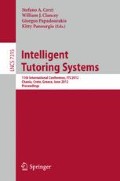Abstract
Educational games intend to make learning more enjoyable, but carry a potential cost of compromising learning efficiency by consuming both instructional time and student cognitive resources. Therefore, instead of creating an educational game, we create a learning environment with game-like elements, the aspects of games that are engaging, but that hopefully do not negatively impact the learning effectiveness of the system. We present an approach of incrementally making a tutor more game-like, and present an evaluation to estimate the effect of game-like elements in terms of their benefits such as enhancing engagement and learning as well as their costs such as distraction and working memory overload. We developed four different versions of a math tutor with different degrees of game-likeness, such as adding narrative and visual feedback. The four systems were pedagogically equivalent consisting of 27 main tutor problems with the same hint and bug messages and mini tutorial lessons. Based on a study with 252 students, we found that students reported more satisfaction with a more “game-like” tutor. Students also took an 11-item pretest and posttest and the students with the most game-like tutor have significant learning gain but there is no reliable difference between the different versions of the tutor.
Access this chapter
Tax calculation will be finalised at checkout
Purchases are for personal use only
Preview
Unable to display preview. Download preview PDF.
References
Koedinger, K.R., Corbett, A.: Cognitive tutors: Technology bringing learning science to the classroom. In: The Cambridge Handbook of the Learning Sciences, pp. 61–78. Cambridge University Press (2006)
O’Neil, H., Wainess, R., Baker, E.: Classification of learning outcomes: Evidence from the computer games literature. The Curriculum Journal 16(4), 455–474 (2005)
Sitzmann, T.: A Meta-Analytic Examination of the Instructional Effectiveness of Computer-Based Simulation Games. Personnel Psychology (2011)
Easterday, M.W., Aleven, V., Scheines, R., Carver, S.M.: Using Tutors to Improve Educational Games. In: Biswas, G., Bull, S., Kay, J., Mitrovic, A. (eds.) AIED 2011. LNCS(LNAI), vol. 6738, pp. 63–71. Springer, Heidelberg (2011)
Jackson, G.T., McNamara, D.S.: Motivational impacts of a game-based intelligent tutoring system. In: Murray, R.C., McCarthy, P.M. (eds.) Proceedings of the 24th International Florida Artificial Intelligence Research Society (FLAIRS) Conference, pp. 519–524. AAAI Press, Menlo Park (2011)
Aleven, V., Myers, E., Easterday, M., Ogan, A.: Toward a framework for the analysis and design of educational games. In: Third IEEE International Conference on Digital Game and Intelligent Toy Enhanced Learning, pp. 69–76 (2010)
Malone, T.W., Lepper, M.R.: Making learning fun: A taxonomy of intrinsic motivations for learning. Aptitude, Learning and Instruction 3, 223–253 (1987)
Gee, J.P.: What Video Games Have to Teach Us About Learning and Literacy. Palgrave/Macmillan, New York (2003)
Hays, R.T.: The effectiveness of instructional games: A literature review and discussion. Naval Air Warfare Center Training Systems Division, Orlando (2005)
Wilson, K.A., Bedwell, W.L., Lazzara, E.H., Salas, E., Burke, S.C., Estock, J.L., Orvis, K.L., Conkey, C.: Relationships between game attributes and learning outcomes: Review and research proposals. Simulation & Gaming 40(2), 217–266 (2008)
Garris, R., Ahlers, R., Driskell, J.E.: Games, Motivation and learning: A research and practice model. Simulation & Gaming 33(4), 441–467 (2002)
Shaffer, D.W., Resnick, M.: "Thick" Authenticity: New Media and Authentic Learning. Journal of Interactive Learning Research 10(2), 195–215 (1999)
Sweller, J.: Cognitive load theory, learning difficulty and instructional design. Learning and Instruction 4, 295–312 (1994)
Hegarty, M., Mayer, R.E., Monk, C.A.: Comprehension of Arithmetic Word Problems: A Comparison of Successful and Unsuccessful Problem Solvers. Journal of Educational Psychology 87, 18–32 (1995)
Glymour, C., Scheines, R.: Causal modeling with the TETRAD program. Synthese, 37–64 (2004)
Wittgenstein, L.: Philosophical Investigations. Prentice Hall (1953)
Boyer, K.E., Phillips, R., Wallis, M., Vouk, M., Lester, J.: Balancing Cognitive and Motivational Scaffolding in Tutorial Dialogue. In: Woolf, B.P., Aïmeur, E., Nkambou, R., Lajoie, S. (eds.) ITS 2008. LNCS, vol. 5091, pp. 239–249. Springer, Heidelberg (2008)
Mayer, R.: Multimedia Learning, 2nd edn. Cambridge University Press, NY (2009)
Clark, R.E.: Games for Instruction? Presentation at the American Educational Research Association, New Orleans, LA (2011)
Andersen, E., Liu, Y., Snider, R., Roy, S., Zoran, P.: Placing a Value on Aesthetics in Online Casual Games. In: ACM CHI Conference on Human Factors in Computing Systems (2011)
Rai, D., Beck, J.E.: Causal Modeling of User Data from a Math Learning Environment with Game-Like Elements. In: Biswas, G., Bull, S., Kay, J., Mitrovic, A. (eds.) AIED 2011. LNCS, vol. 6738, pp. 528–530. Springer, Heidelberg (2011)
Author information
Authors and Affiliations
Editor information
Editors and Affiliations
Rights and permissions
Copyright information
© 2012 Springer-Verlag Berlin Heidelberg
About this paper
Cite this paper
Rai, D., Beck, J.E. (2012). Math Learning Environment with Game-Like Elements: An Incremental Approach for Enhancing Student Engagement and Learning Effectiveness. In: Cerri, S.A., Clancey, W.J., Papadourakis, G., Panourgia, K. (eds) Intelligent Tutoring Systems. ITS 2012. Lecture Notes in Computer Science, vol 7315. Springer, Berlin, Heidelberg. https://doi.org/10.1007/978-3-642-30950-2_13
Download citation
DOI: https://doi.org/10.1007/978-3-642-30950-2_13
Publisher Name: Springer, Berlin, Heidelberg
Print ISBN: 978-3-642-30949-6
Online ISBN: 978-3-642-30950-2
eBook Packages: Computer ScienceComputer Science (R0)

